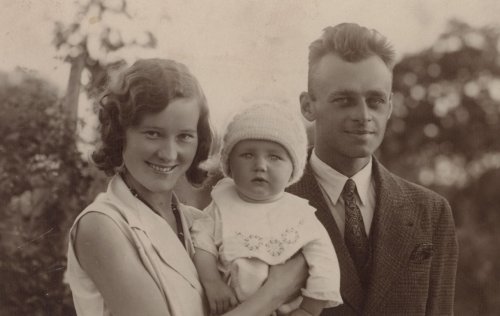Before I turned on the tape recorder, you told me the story of how you saved the life of a small kitten from your yard and called her “Rotka” – to honour the Rottmeister. Was sensitivity to the fate of the weaker beings, to nature in general, one of the values your father taught you?
Most definitely. Dad always stressed that every living being has an enormous role to play. He explained to me that if you break the chain it will stop working. We were walking once. At some point my dad noticed a ladybug, underneath my feet, which I didn’t see. “Pay attention! You almost stomped on a ladybug – he said to me. – Take it and put it on a leaf. It will be safe there”. He also taught me that a horse is an extraordinary animal which has a soul. Why?
“Well, because it is so smart – said my dad – when I was once galloping on my mare, Fable, to our residence in Sukurcze, she suddenly stopped. At first, it seemed she did that for no reason. It turned out; however, that a child was lying on the ground which I couldn’t see from horseback”.
It was proof for my dad how incredible creatures horses are. It all speaks to his great sensitivity. I try to live by his values every day, so now I not only take care of homeless cats, but even local titmice and pigeons. For many years I have had a beloved dog.
Dad felt nature with all of himself. I later wondered, how was it possible that he managed to survive the Auschwitz camp with his sensitivity… Was he aware that he was volunteering to go to such hell? He was a man of many talents which he didn’t hide, but rather improve on them whenever he could. He wrote a poem about Sukurcze, which part I later found. He was also a great painter: he painted a white and blue fresco of the Holy Mother breastfeeding above my parents’ bed; for kids – gnomes dancing around a mushroom. Truly a sight to behold!
There is also a famous anecdote that, in order to impress your mother, he would throw a bouquet of lilacs through an open window while galloping on a horse.
It actually happened. Father had the bravado of a cavalryman, an uhlan’s imagination. And he didn’t lose it after the wedding. Mother was a teacher at a local school. When she came back home, tired after work, there was always some kind of attraction waiting for her: father dressed me and my brother Jędrek e.g. for a lady and an uhlan, or for people from Japan, or characters from fables.
It doesn’t really fit the stereotype of an old-fashioned, pre-war officer – harsh, down to earth, focused on his career. And here – we had a natural educator!
You put it well. Every day he taught us values which we should live by. Today, it seems to me like he was in a rush. Like he knew he didn’t have much time. He called me “the heir of fresh air”. I asked him what he meant by that. He explained to me, that what I’m enjoying and admiring today may no longer be there one day. And that I would need to adjust to that new reality. He told me I had to be “a lady general” – a brave person who can make do in any situation. He paid much attention to physical education. When he escaped the camp in 1943, I was 10 years old. He stayed in Warsaw, while we lived with grandma in Ostrów Mazowiecka. I would often come to him and report on all my achievements in sport: that I can do a twine, that I already run one hundred metres, that I’m in a volleyball team, that I swim…
The ful text is available here
